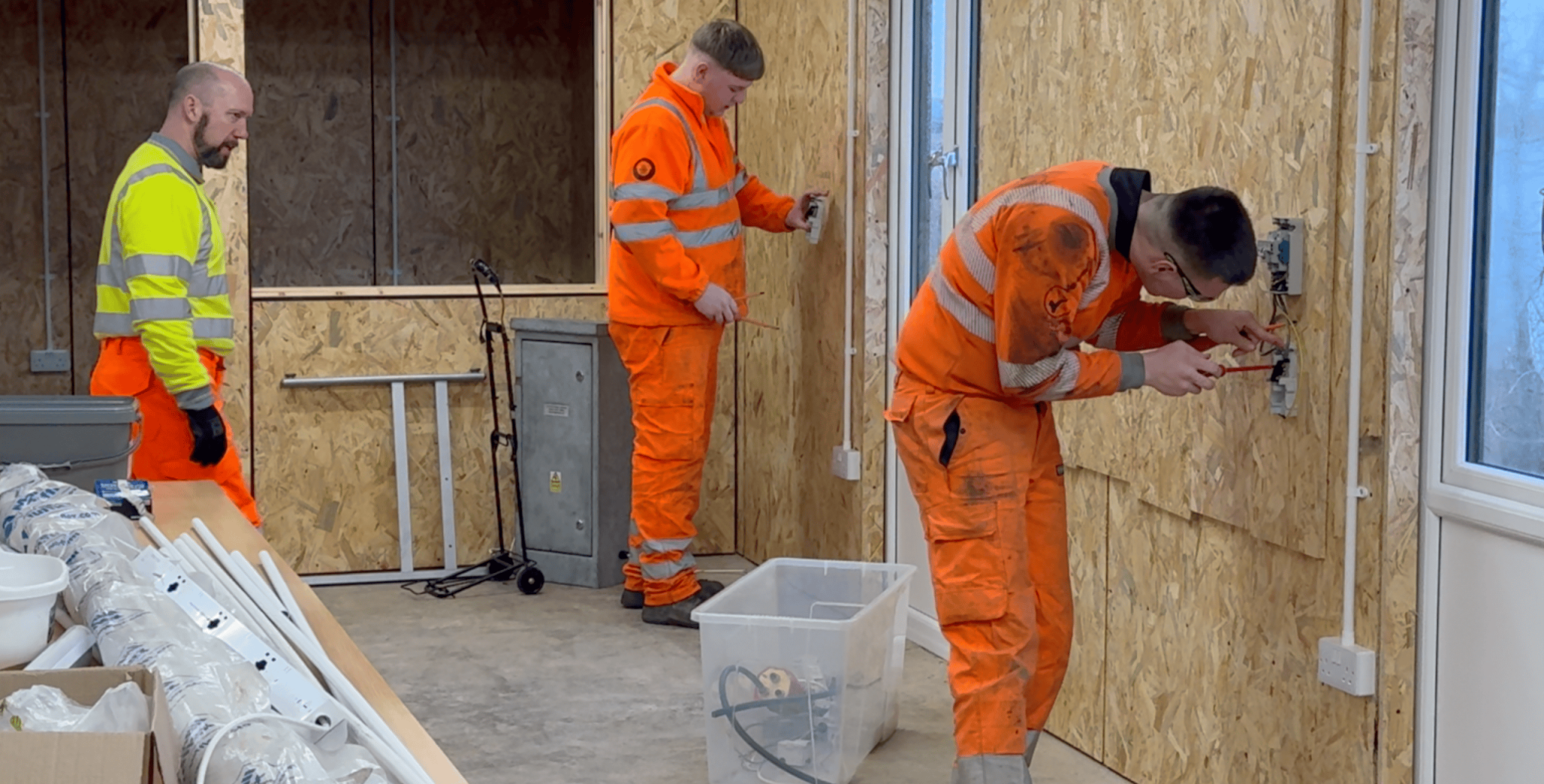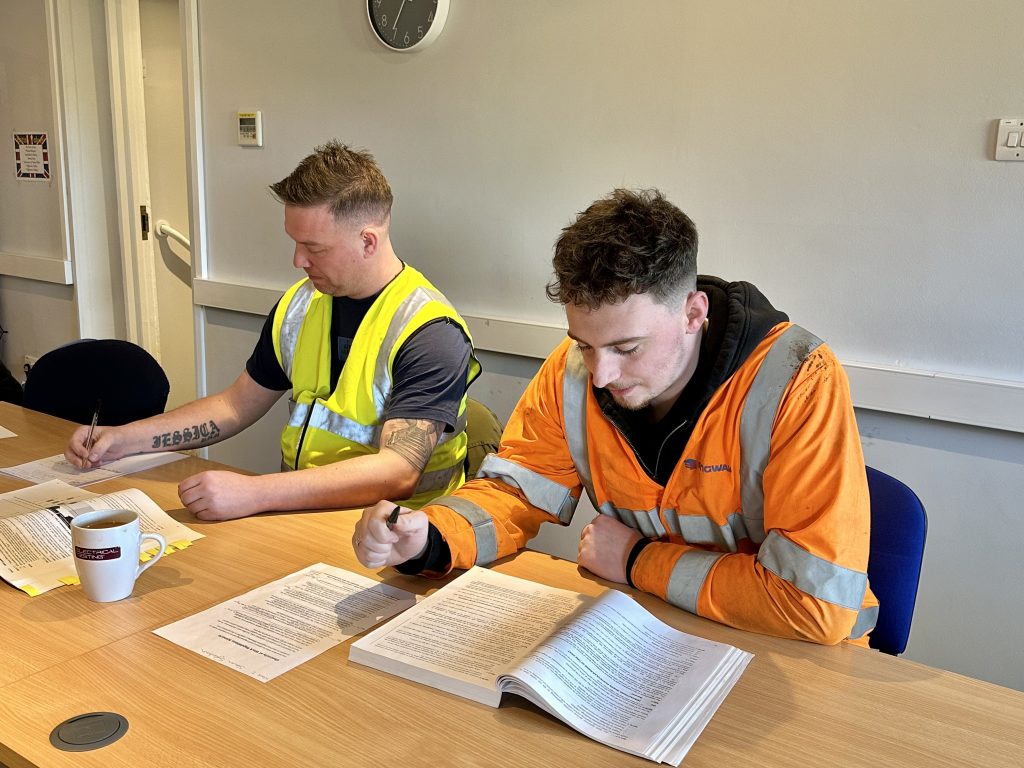Highway Electrical
Apprenticeships
In an industry hungry for new talent, our government backed apprenticeships provide highly skilled training and on site learning, helping you to develop your workforce.
Why apprenticeships matter?
Government backed apprenticeships are a recognised way of enhancing skills and building capability into your organisation. They keep staff motivated and engaged for the long term while developing their skills over a long period with both classroom and practical on site training.

Why use Electrical Testing Ltd?
As a leading Highway Electrical Apprenticeship provider, and recently rated ‘Good’ from Ofsted. We have been delivering the knowledge units of the apprenticeship for over 15 years and with technical units delivered early within the apprenticeship your apprentices will be more useful in a much shorter space of time. This will mean they can start generating real business benefits sooner.
As we deliver in 1 week blocks less time is spent re-capping and more time is spent learning. Practical tasks and tough subjects can be delivered in a continuous way making it much easier for the learner to retain the information
Highway electrical apprenticeships really can be a win, win situation for both employers and employees. Employers gain skilled labour who are professionally trained by ETL and by you in the skills and processes that you are most in need of.
They also offer an affordable solution for your work force needs, not just in the short term but also in the longer term as they grow with your business.

Location
Our ETL Training Centre, is situated on the Norfolk broads, just outside Norwich.
Our purpose built, air conditioned classrooms and skills rooms are designed to provide a safe and relaxed area in order to give learners the maximum opportunity for development and learning.
Cohorts of between 8 and 10 are taught by highly experienced, skilled tutors with years of industry experience behind them.
Costs

All companies whose wage bill is over £3 million are required by law to pay into the apprenticeship levy, however, this tax can be recouped by companies, by putting qualifying staff through apprenticeship training. The highly skilled training covers a wide range of highways industry specific tasks and can result in a Level 2 or Level 3 apprenticeship.
Even companies who don’t pay into the levy can receive funds towards training with some small costs to pay for the employer.

Taking on an Electrical Apprentice
Are you thinking of taking on more staff? If so it could be a good opportunity to consider taking on a highway electrical apprentice. Not only will you work with motivated fresh individuals but you will also benefit from the professional training that can be provided here by ETL.
Depending on the age of your apprentice you could find that some or all of their electrical apprenticeship can be funded, saving you money and providing you with skilled labour that can add to your work force.

Frequently Asked Questions
An apprenticeship is a structured training programme that combines hands-on work experience with academic study. Apprentices earn a wage while they learn, offering a balanced approach to career development.
Why Choose a Highway Electrical Apprenticeship?
A Highway Electrical Apprenticeship provides a comprehensive, quality-assured education that is nationally recognised. It prepares apprentices for various roles within the industry, making it a valuable asset for career advancement.
What Qualifications Do I Need to Start an Apprenticeship?
For Level 2, no prior qualifications are needed. For Level 3, you must complete Level 2 or hold a relevant HERS Card and undergo an onboarding interview. Level 3 also requires Functional Skills (FS) Maths and English Level 2, or FS Level 1 Maths and English, or equivalent (GCSE Grade 3).
What is the Duration of the Apprenticeship?
The Highway Electrical Systems (HE) Apprenticeship lasts for 24 months for both Level 2 and Level 3.
What Do Level 2 and Level 3 Courses Cover?
Level 3 Courses
The Level 3 courses are more advanced and include:
· Inspection & Testing: Deepening your understanding of electrical principles.
· Highway Lighting Photometric Testing: Learning how to test and measure lighting for highways.
· Advanced Electrical Theory: Advanced topics that prepare you for more complex tasks.
· Cable Jointing: Learning the skills needed to join and repair cables.
· Diagnose Fault and Replace Faulty Components: Advanced troubleshooting and repair techniques.
Level 2 Courses
The Level 2 courses offer a comprehensive introduction to the Highway Electrical industry. Topics covered include:
· Health, Safety and Environment at Work: Understanding workplace safety and environmental considerations.
· Electrical Safety: Learning the basics of electrical safety, including the safe use of electrical equipment.
· On-Site Safety: Focusing on safe practices while working on-site, including the use of Personal Protective Equipment (PPE).
· Erect Columns and Brackets: Practical training on the installation and maintenance of highway electrical infrastructure.
· Install Underground Cables: Hands-on experience with laying and connecting underground cables.
Funding?
Funding for Highway Electrical Apprenticeships is multi-faceted. Government grants are often available, which can significantly subsidise the cost of training. Employers may also contribute to the funding, either as a co-investment with the government or as the sole funder. Some apprentices may also be eligible for additional support, such as travel or equipment grants. It’s crucial to consult with a qualified training provider to explore all the available funding options and understand the financial commitments involved.
Will I Get Paid During My Apprenticeship?
Apprentices receive at least the minimum apprenticeship wage, although employers often offer more.
Can I Switch Employers During the Apprenticeship?
Yes, switching employers during the apprenticeship is permissible and can be coordinated with your training provider.
Is There an Age Limit for Apprenticeships?
There is no age limit for participating in an apprenticeship programme.
What Happens After Completing the Apprenticeship?
After completing Level 2, apprentices can progress to Level 3. From there, they can move onto HE Level 3 NVQ Supervisor qualifications and other vocational courses and awards within the HE sector and beyond.
Can I Pursue Higher Education After an Apprenticeship?
Yes, after completing Level 3, you can pursue the HE Supervisor NVQ and other relevant courses and pathways.
